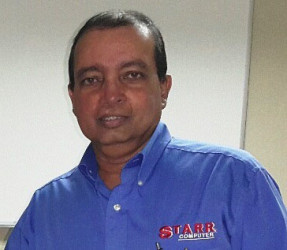Arising from the outcomes of his own experience a decade ago in renewable energy, Chief Executive Officer of Starr Computers Michael Mohan is recommending that both domestic consumers and business houses move in that direction without undue delay.
With energy charges very often amounting to more than 20 per cent of operating costs in some local businesses, Mohan says, that what, these days, are relatively modest investments in solar panels and other basic infrastructure associated with renewable energy, consumers are likely to experience an immediate drop in electricity costs which, in some instances, can make a difference to the survival or otherwise of an enterprise.
There were skeptics—even amongst his own staff—when the idea was first mooted, Mohan told Stabroek Business, but his own persistence eventually resulted in the project coming to fruition and the slashing of his electricity costs from the national grid by as much as 35 per cent.

You have to ascend to the roof of the complex housing Starr Computers to see the assortment of panels that trap energy from the sun to power the vast majority of the company’s appliances including its air conditioners and other office and domestic equipment. The use of heat reflective paint on the roof also supports the whole concept of trapping energy. Mohan said alternative energy is “invaluable” to a company that depends heavily on electricity for its operations. “Whatever we do these days we take account of electricity consumption. There used to be a time when our energy costs were a killer,” he added.
Mohan believes that his own long-term vision has been vindicated, not only by his own success as a user of solar energy but also by the current focus of the government of Guyana on this alternative source of power. He believes, he says, that the recent announcement of an oil find must not render the country insensitive to high fossil fuel costs. “We need to take a careful look at what is involved here. The investment in panels and batteries are considerably smaller than when Starr took the plunge. High quality panels can serve for at least 25 years whilst batteries can last for as many as 15 years,” he noted.
The IT solutions company CEO also sees considerable advantage in investing in what he describes as “relatively low-maintenance technology,” pointing out that in the case of the panels “it comes down to hosing them down from time to time to get the dust off so that they can harness maximum energy.”
While he considers himself a pioneer investor in the field in the business community, Mohan says that he has no interest in selling solar technology. “It really is a matter of taking an initiative which, in the final analysis, will contribute not only to lowering the cost of doing business in Guyana but making it possible for more Guyanese to invest in a business venture.”
Mohan says Starr Computers will be seeking to utilize its knowledge and experience to stage seminars and workshops for potential consumers of alternative energy. “It really is a matter of helping to extend knowledge of alternative energy and its advantage in both the domestic and business sectors,” he said.





